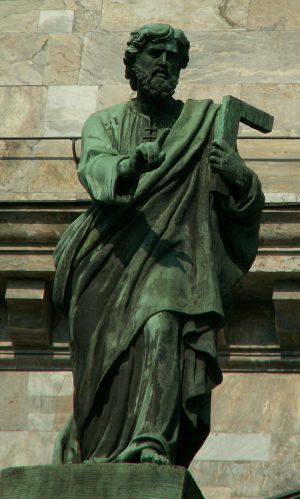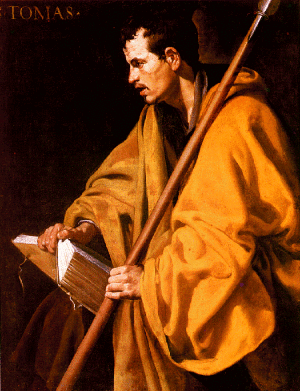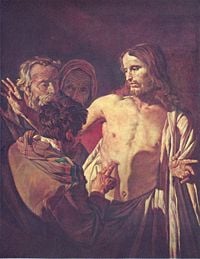Book of Thomas the Contender
The Book of Thomas the Contender, also known more simply as the Book of Thomas (not to be confused with the Gospel of Thomas), is one of the works of the New Testament Apocrypha discovered in the Nag Hammadi library, a cache of mostly gnostic literature buried in the Egyptian desert until the mid twentieth century. The title derives from the book's first line, "The secret words that the savior spoke to Judas Thomas," combined with a line appended to the end of the text which identifies the author as "the Contender writing to the Perfect."
The Book of Thomas the Contender may have originally been two separate works, one a dialogue, the other a monologue or letter. Its content is clearly gnostic in the sense of conveying secret knowledge from Jesus by which humans can be perfected through spiritual enlightenment, rather than through sacraments or belief in the atoning power of Jesus' death on the Cross. It is also strongly ascetic in character, especially on the question of sexual relations, which it condemns as procreating bodies that are no better than those of animals.
It is difficult to judge how well known or widely read Thomas the Contender may have been. However, scholars believe that it forms part of a wider body of "Thomas" literature that played an important role in the formation of early Christianity.
Composition and date
There are two competing theories as to the composition of the text. The first emphasizes the fact that the actual dialog between Thomas and Jesus lasts only for about three fifths of the text, with the remainder being a monologue by Jesus. The current book may thus have originally been two works, one of dialog, one of monologue or letter. The second theory holds that the work originated as a letter, an Epistle of the Contender, written by a non-Christian Jew who upheld a semi-gnostic Hellenic philosophy. In this theory, the text was later given a Christian setting and converted for the most part into a dialog. An additional consideration is that, since the scribe writing the text is named Matthaias, this work may be the same as the lost Gospel of Matthias referred to in the writings of the Church Fathers, several of whom associate it with gnostic heresy.
The Book of Thomas the Contender was probably composed in the early third century C.E. It appears to be part of the gnostic or proto-gnostic tradition exemplified in the Gospel of Thomas (50-125 C.E.), and the Acts of Thomas, (c. 225 C.E.).
Message and significance
The "Thomas" tradition in early Christianity portrays Judas Thomas as the recipient of special knowledge from Jesus. The tradition speaks of Jesus primarily as a teacher of mystical insight, rather than the Son of God sent to save mankind from sin by dying on the Cross. The physical resurrection of Jesus plays no part in this theology, for the physical body is seen only as the prison of the spirit. Some scholars, such as Elaine Pagels (2003), suggest that the story of "Doubting Thomas"âwho refused to believe that Christ had risen until he received proof by touching the resurrected savior's physical woundsâmay have been added into the orthodox Gospel tradition to denigrate the "Thomas Christians" who denied the necessity of Jesus' physical resurrection.
The content of Thomas the Contender is gnostic in character, in the sense of Jesus imparting a secret knowledge which emphasizes spiritual enlightenment and the denial of the physical body. It lacks specific references to the elaborate gnostic cosmology of Valentinian Gnosticism, but the outline of such a cosmology may be inferred by the book's emphasis on concepts such as truth versus illusion, resisting the pleasures of the flesh, the body as a prison for the spirit, the heavenly pleroma ("fullness"), and spiritual perfection associated with a secret doctrine which most hearers cannot understood.
A prominent theme in this work is the need to forgo sexual relations between men and women, which it sees as based on the passion for fleshly pleasure, leading to the procreation of physical bodies which are no better than those of beasts. The book is thus related to the doctrine of encratisim, which forbade marriage and followed a vegetarian diet. However, it is not possible to draw a direct connection between the book and the known encratist movements referred to by the Church Fathers. The Book of Thomas the Contender has also been seen as containing elements of Manicheanism, especially in its dualism and asceticism.
In a more modern interpretation, the dialog can also be read as an internal conversation between Jesus and his "lower self," Judas Thomas, sometimes called "the Twin," who is cast as the "contender" for supremacy of the soul. In this view, the New Testament's "Doubting Thomas" and Judas, "the betrayer," could also be descriptive of an internal battle between the Christ Self and "ego identity."
Summary

The book opens by identifying its writer as Mathaias, who transcribed the following dialog between Jesus and Thomas. Jesus acknowledges Thomas' reputation as his "twin and true companion" and encourages him to learn his true identity, which cannot be known as long as he remains in ignorance. Jesus identifies himself as "the knowledge (Greek: gnosis) of the truth," and predicts that in the future, Thomas will be called "the one who knows himself."
Thomas implores Jesus to teach him of "the hidden things," so that he can speak of them to his fellow humans after the savior's ascension. Jesus explains that our "visible bodies" survive by devouring other living creatures, and thus become subject to change and decay. "That body is bestial," he explains, originating from sexual intercourse like any lower animal. He therefore instructs his disciples to be "like babes" until they reach perfection.
"Why does this visible light (the sun) that shines on behalf of men rise and set?" Thomas asks. The savior replies that the sun is merely part of a transitory existence, and that "when all the elect abandon bestiality," even the sun will "withdraw up to its essence." The time of the end is close at hand: "Only a little while longer, and that which is visible will dissolve."
He goes on to denounce the "fire" of passion, which makes the minds of both males and females drunk and deranges their souls, "for the males move upon the females and the females upon the males." Jesus advises that truth seekers "make themselves wings" to fly from such lusts.
This, Jesus explains, is "the doctrine of the perfect." Only the foolish are guided by the "fire," which provides the illusion of truth, but in the end imprisons them in "a dark sweetness" and blinds them with "insatiable lust." On the other hand, he declares: "Blessed is the wise man who sought after the truth, and when he found it, he rested upon it forever and was unafraid of those who wanted to disturb him."
Thomas asks how he and the other disciples should deal with those who defend physical life and procreation, since without these things humans cannot know salvation. Jesus gives a harsh reply to this query: "Do not esteem them as men, but regard them as beasts, for just as beasts devour one another, so also men of this sort devour one another."
"How can we go preach to them," Thomas protests, "since we are not esteemed in the world?" Jesus predicts that those who do listen will be persecuted by the rulers of this world, who in turn are under the dominion of powerful evil angels.
At this point Jesus alone speaks for the rest of the book. He begins with a series of curses:
"Woe to you, godless ones, who have no hope, who rely on things that will not happen! Woe to you who hope in the flesh and in the prison that will perish!... Woe to you within the fire that burns in you, for it is insatiable!... Woe to you who love intimacy with womankind and polluted intercourse with them! Woe to you in the grip of the powers of your body, for they will afflict you!... Woe to you, for you did not receive the doctrine."
These woes are followed in turn by a series of blessings on those who do receive the truth:
"Blessed are you who have prior knowledge of the stumbling blocks and who flee alien things. Blessed are you who are reviled and not esteemed on account of the love their lord has for them. Blessed are you who weep and are oppressed by those without hope, for you will be released from every bondage"
The book closes with an encouragement to avoid association with the flesh and to free oneself from the prison of the body: "For when you come forth from the sufferings and passions of the body, you will receive rest from the Good One, and you will reign with the king, you joined with him and he with you, from now on, for ever and ever."
Quotes
- He who has not known himself has known nothing, but he who has known himself has at the same time already achieved knowledge about the depth of the all.
- Blessed is the wise man who sought after the truth, and when he found it, he rested upon it forever.
- Woe to you who love intimacy with womankind and polluted intercourse with them! Woe to you in the grip of the powers of your body, for they will afflict you!
- You are babes until you become perfect.
- They fulfill the lust of their fathers. They will be thrown down to the abyss and be afflicted by the torment of the bitterness of their evil nature.
- Do not esteem them as men, but regard them as beasts, for just as beasts devour one another, so also men of this sort devour one another.
- Blessed are you who weep and are oppressed by those without hope, for you will be released from every bondage... You will reign with the king, you joined with him and he with you
See also
ReferencesISBN links support NWE through referral fees
- Attridge, Harold W., Charles W. Hedrick, and Robert Hodgson. Nag Hammadi, Gnosticism & Early Christianity. Peabody, MA: Hendrickson Publishers, 1986. ISBN 9780913573167
- Meyer, Marvin W. The Gnostic Discoveries: The Impact of the Nag Hammadi Library. New York: HarperCollins, 2005. ISBN 9780060821081
- Pagels, Elaine H. Beyond Belief: The Secret Gospel of Thomas. New York: Random House, 2003. ISBN 9780375501562
- Sell, Jesse. The Knowledge of the TruthâTwo Doctrines: The Book of Thomas the Contender (CG II,7) and the False Teachers in the Pastoral Epistles. Europäische Hochschulschriften, Bd. 194. Frankfurt am Main: Lang, 1982. ISBN 9783820472240
- Turner, John Douglas. The Book of Thomas the Contender, from Codex II of the Cairo Gnostic Library from Nag Hammadi (CG II, 7): The Coptic Text, with Translation, Introd., and Commentary. Missoula, MT: Society of Biblical Literature, 1975. ISBN 9780891300175
Credits
New World Encyclopedia writers and editors rewrote and completed the Wikipedia article in accordance with New World Encyclopedia standards. This article abides by terms of the Creative Commons CC-by-sa 3.0 License (CC-by-sa), which may be used and disseminated with proper attribution. Credit is due under the terms of this license that can reference both the New World Encyclopedia contributors and the selfless volunteer contributors of the Wikimedia Foundation. To cite this article click here for a list of acceptable citing formats.The history of earlier contributions by wikipedians is accessible to researchers here:
The history of this article since it was imported to New World Encyclopedia:
Note: Some restrictions may apply to use of individual images which are separately licensed.

